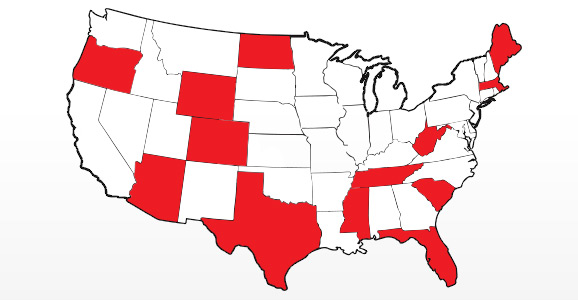
A staggering 92% of employers require their employees to have employment background checks. The Consumer Financial Protection Bureau (CFPB) oversees the Fair Credit Reporting Act (FCRA) and works to insure certain standards are followed. In addition to the FCRA, each state has the right to insure another layer of protections (so long as they do not conflict federal regulations), which vary from state to state. In any case, when you are conducting employment background checks, you should make sure your actions and interpretations are fair and congruent with both federal and state employment background check laws. The following information addresses some of most common areas in which state legislation can vary across state lines.
Criminal Records
Just because arrests are discovered through criminal background checks doesn't mean the individual was involved in criminal conduct. Simply put, an individual's arrest record shouldn't be used to base a negative action regarding their employment. On the other hand, a conviction is direct indication the individual was found guilty of participating in criminal misconduct. The rules for making employment decisions based on conviction records and arrests will vary from state to state. The variations can range from limiting an employer's ability to ask about an applicant's arrest records to requiring employers abstain from asking about criminal records until the latter stages of the hiring process.
Credit Check
While credit checks are necessary when you apply for practically any type of charge account, employers may still use credit checks when hiring. A credit check will reveal an individual's payment and credit history, which offers insight into one's financial maturity and their integrity. However, a growing number of people consider a person's credit history an unfair indicator of character. Considering the recent times of financial difficulty, several responsible individuals may suffer from blotted credit histories. Although most states view credit checks a legal and fair form of employment background checks, a growing number of states (California, Colorado, Connecticut, Hawaii, Illinois, Nevada, Maryland, Oregon, Vermont, and Washington) have banned the practice. In addition, several other states and equal opportunity groups challenge the ability to review credit information.
Medical Records
The federal law, Americans with Disabilities Act, prohibits employers from discriminating applicants based on mental or physical impairment. In addition, this law prohibits you from requesting an employee's medical history records. You are allowed to inquire and insure the applicant is able to complete the tasks assigned to the job. Due to the sensitive nature of an individual's medical records, some states have additional and more stringent laws protecting these documents.
Social Media
With such a domineering number of adults on social networks, employers have begun a practice of asking employees to give their personal username and password to their personal social media account. Employers argue that access will help protect trade secrets and proprietary information, help comply with federal regulations, and prevent and reduce the amount of legal liability exposure. At the same time, several groups consider using social media for employment background checks is severe invasion of privacy. Without federal legislation in place, state legislatures began crafting legislation designed to prevent employers from requiring applicants provide such personal information in 2012. Today, several states have legislation in place to prevent employers from engaging in this sort of activity.
Employee background checks are one of the few ways employers can protect their business and all affiliated parties. At the same time, the amount of information made available through employment background checks can present a problem. To remedy this potential problem, both federal and state legislation is designed to offer job finders a level playing field. While federal legislation is the same no matter which state you are in, state laws can and will commonly be different as you switch states.
Too many questions? Let VeriFirst FCRA certified representatives guide you today!
And stay tuned to part 2 of this topic where we dive deeper into VeriFirst's State-by-State compliance filter to help our clients adhere to state specific employee screening regulations.